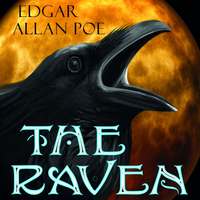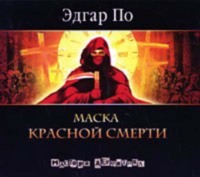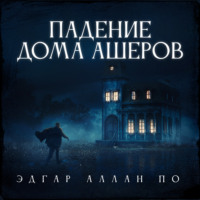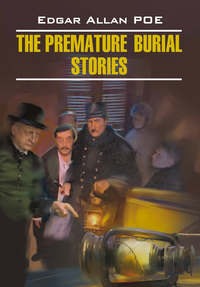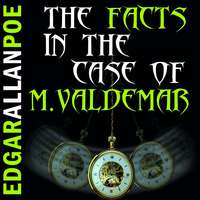 полная версия
полная версияThe Complete Stories of Edgar Allan Poe
Darkness covered the universe. Nature mourned, for its parent had died. The earth had enrobed herself in the habiliments of sorrow, and the heavens were clothed in the sables of mourning. I now roamed in restlessness, and heeded not whither I went. At once there appeared a light in the east. A column of light shot athwart the gloom, like the light-shot gleams on the darkness of the midnight of the pit, and illumined the sober murkiness that surrounded me. There was an opening in the vast arch of heaven’s broad expanse. With wondering eyes, I turned towards it.
Far into the wilderness of space, and at a distance that can only be meted by a “line running parallel with eternity,” but still awfully plain and distinct, appeared the same person whom I had clothed with the mock purple of royalty. He was now garmented in the robe of the King of kings. He sat on his throne; but ‘twas not one of whiteness. There was mourning in heaven; for, as each angel knelt before him, I saw that the wreath of immortal amaranth which was wont to circle his brow, was changed for one of cypress.
I turned to see whither I had wandered. I had come to the burial ground of the monarch of Israel. I gazed with trembling, as I saw the clods which covered the mouldering bones of some tyrant begin to move. I looked at where the last monarch had been laid, in all the splendour and pageantry of death, and the sculptured monument began to tremble. Soon it was overturned, and from it issued the tenant of the grave. ‘Twas a hideous, unearthly form, such as Dante, in his wildest flights of terrified fancy, ne’er conjured up. I could not move, for terror had tied up volition. It approached me. I saw the grave-worm twining itself amongst the matted locks which in part covered the rotten scull. The bones creaked on each other as they moved on the hinges, for its flesh was gone. I listened to their horrid music, as this parody on poor mortality stalked along. He came up to me; and, as he passed, he breathed the cold damps of the lonely, narrow house directly in my face. The chasm in the heavens closed; and, with a convulsive shudder, I awoke.
THE END
The Duc de L’Omelette (1831)
And stepped at once into a cooler clime.
Cowper.KEATS fell by a criticism. Who was it died of “The Andromache?” Ignoble souls! – De L’Omelette perished of an ortolan. L’histoire en est brève. Assist me, Spirit of Apicius!
A golden cage bore the little winged wanderer, enamored, melting, indolent, to the Chaussée D’Antin, from its home in far Peru. From its queenly possessor La Bellissima, to the Duc De L’Omelette, six peers of the empire conveyed the happy bird.
That night the Duc was to sup alone. In the privacy of his bureau he reclined languidly on that ottoman for which he sacrificed his loyalty in outbidding his king, – the notorious ottoman of Cadet.
He buries his face in the pillow. The clock strikes! Unable to restrain his feelings, his Grace swallows an olive. At this moment the door gently opens to the sound of soft music, and lo! the most delicate of birds is before the most enamored of men! But what inexpressible dismay now overshadows the countenance of the Duc? – “Horreur! – chien! – Baptiste! – l’oiseau! ah, bon Dieu! cet oiseau modeste que tu as deshabillé de ses plumes, et que tu as servi sans papier!” It is superfluous to say more: – the Duc expired in a paroxysm of disgust.
“Ha! ha! ha!” said his Grace on the third day after his decease.
“He! he! he!” replied the Devil faintly, drawing himself up with an air of hauteur.
“Why, surely you are not serious,” retorted De L’Omelette. “I have sinned – c’est vrai – but, my good sir, consider! – you have no actual intention of putting such – such – barbarous threats into execution.”
“No what?” said his majesty – “come, sir, strip!”
“Strip, indeed! very pretty i’ faith! no, sir, I shall not strip. Who are you, pray, that I, Duc De L’Omelette, Prince de Foie-Gras, just come of age, author of the ‘Mazurkiad,’ and Member of the Academy, should divest myself at your bidding of the sweetest pantaloons ever made by Bourdon, the daintiest robe-de-chambre ever put together by Rombert – to say nothing of the taking my hair out of paper – not to mention the trouble I should have in drawing off my gloves?”
“Who am I? – ah, true! I am Baal-Zebub, Prince of the Fly. I took thee, just now, from a rose-wood coffin inlaid with ivory. Thou wast curiously scented, and labelled as per invoice. Belial sent thee, – my Inspector of Cemeteries. The pantaloons, which thou sayest were made by Bourdon, are an excellent pair of linen drawers, and thy robe-de-chambre is a shroud of no scanty dimensions.”
“Sir!” replied the Duc, “I am not to be insulted with impunity! – Sir! I shall take the earliest opportunity of avenging this insult! – Sir! you shall hear from me! in the meantime au revoir!” – and the Duc was bowing himself out of the Satanic presence, when he was interrupted and brought back by a gentleman in waiting. Hereupon his Grace rubbed his eyes, yawned, shrugged his shoulders, reflected. Having become satisfied of his identity, he took a bird’s eye view of his whereabouts.
The apartment was superb. Even De L’Omelette pronounced it bien comme il faut. It was not its length nor its breadth, – but its height – ah, that was appalling! – There was no ceiling – certainly none – but a dense whirling mass of fiery-colored clouds. His Grace’s brain reeled as he glanced upwards. From above, hung a chain of an unknown blood-red metal – its upper end lost, like the city of Boston, parmi les nues. From its nether extremity swung a large cresset. The Duc knew it to be a ruby; but from it there poured a light so intense, so still, so terrible, Persia never worshipped such – Gheber never imagined such – Mussulman never dreamed of such when, drugged with opium, he has tottered to a bed of poppies, his back to the flowers, and his face to the God Apollo. The Duc muttered a slight oath, decidedly approbatory.
The corners of the room were rounded into niches. – Three of these were filled with statues of gigantic proportions. Their beauty was Grecian, their deformity Egyptian, their tout ensemble French. In the fourth niche the statue was veiled; it was not colossal. But then there was a taper ankle, a sandalled foot. De L’Omelette pressed his hand upon his heart, closed his eyes, raised them, and caught his Satanic Majesty – in a blush.
But the paintings! – Kupris! Astarte! Astoreth! – a thousand and the same! And Rafaelle has beheld them! Yes, Rafaelle has been here; for did he not paint the —? and was he not consequently damned? The paintings! – the paintings! O luxury! O love! – who, gazing on those forbidden beauties, shall have eyes for the dainty devices of the golden frames that besprinkled, like stars, the hyacinth and the porphyry walls?
But the Duc’s heart is fainting within him. He is not, however, as you suppose, dizzy with magnificence, nor drunk with the ecstatic breath of those innumerable censers. C’est vrai que de toutes ces choses il a pensé beaucoup – mais! The Duc De L’Omelette is terror-stricken; for, through the lurid vista which a single uncurtained window is affording, lo! gleams the most ghastly of all fires!
Le pauvre Duc! He could not help imagining that the glorious, the voluptuous, the never-dying melodies which pervaded that hall, as they passed filtered and transmuted through the alchemy of the enchanted window-panes, were the wailings and the howlings of the hopeless and the damned! And there, too! – there! – upon the ottoman! – who could he be? – he, the petitmaitre – no, the Deity – who sat as if carved in marble, et qui sourit, with his pale countenance, si amérement?
Mais il faut agir, – that is to say, a Frenchman never faints outright. Besides, his Grace hated a scene – De L’Omelette is himself again. There were some foils upon a table – some points also. The Duc had studied under B—; il avait tué ses six hommes. Now, then, il peut s’échapper. He measures two points, and, with a grace inimitable, offers his Majesty the choice. Horreur! his Majesty does not fence!
Mais il joue! – how happy a thought! – but his Grace had always an excellent memory. He had dipped in the “Diable” of Abbe Gualtier. Therein it is said “que le Diable n’ose pas refuser un jeu d’écarté.”
But the chances – the chances! True – desperate: but scarcely more desperate than the Duc. Besides, was he not in the secret! – had he not skimmed over Père Le Brun? – was he not a member of the Club Vingt-un? – “Si je perds,” said he, “je serai deux fois perdu – I shall be doubly dammed – voila tout! (Here his Grace shrugged his shoulders.) Si je gagne, je reviendrai à mes ortolans – que les cartes soient préparées!”
His Grace was all care, all attention – his Majesty all confidence. A spectator would have thought of Francis and Charles. His Grace thought of his game. His Majesty did not think; he shuffled. The Duc cut.
The cards are dealt. The trump is turned – it is – it is – the king! No – it was the queen. His Majesty cursed her masculine habiliments. De L’Omelette placed his hand upon his heart.
They play. The Duc counts. The hand is out. His Majesty counts heavily, smiles, and is taking wine. The Duc slips a card.
“C’est à vous à faire,” said his Majesty, cutting. His Grace bowed, dealt, and arose from the table en presentant le Roi.
His Majesty looked chagrined.
Had Alexander not been Alexander, he would have been Diogenes; and the Duc assured his antagonist in taking leave, “que s’il n’eût été De L’Omelette il n’aurait point d’objection d’être le Diable.”
THE END
Metzengerstein (1832)
Pestis eram vivus – moriens tua mors ero.
Martin Luther.Horror and fatality have been stalking abroad in all ages. Why then give a date to this story I have to tell? Let it suffice to say, that at the period of which I speak, there existed, in the interior of Hungary, a settled although hidden belief in the doctrines of the Metempsychosis. Of the doctrines themselves – that is, of their falsity, or of their probability – I say nothing. I assert, however, that much of our incredulity (as La Bruyere says of all our unhappiness) “vient de ne pouvoir être seuls.”
But there are some points in the Hungarian superstition which were fast verging to absurdity. They – the Hungarians – differed very essentially from their Eastern authorities. For example, “The soul,” said the former – I give the words of an acute and intelligent Parisian – “ne demeure qu’un seul fois dans un corps sensible: au reste – un cheval, un chien, un homme meme, n’est que la ressemblance peu tangible de ces animaux. “
The families of Berlifitzing and Metzengerstein had been at variance for centuries. Never before were two houses so illustrious, mutually embittered by hostility so deadly. The origin of this enmity seems to be found in the words of an ancient prophecy – “A lofty name shall have a fearful fall when, as the rider over his horse, the mortality of Metzengerstein shall triumph over the immortality of Berlifitzing.”
To be sure the words themselves had little or no meaning. But more trivial causes have given rise – and that no long while ago – to consequences equally eventful. Besides, the estates, which were contiguous, had long exercised a rival influence in the affairs of a busy government. Moreover, near neighbors are seldom friends; and the inhabitants of the Castle Berlifitzing might look, from their lofty buttresses, into the very windows of the Palace Metzengerstein. Least of all had the more than feudal magnificence, thus discovered, a tendency to allay the irritable feelings of the less ancient and less wealthy Berlifitzings. What wonder, then, that the words, however silly, of that prediction, should have succeeded in setting and keeping at variance two families already predisposed to quarrel by every instigation of hereditary jealousy? The prophecy seemed to imply – if it implied anything – a final triumph on the part of the already more powerful house; and was of course remembered with the more bitter animosity by the weaker and less influential.
Wilhelm, Count Berlifitzing, although loftily descended, was, at the epoch of this narrative, an infirm and doting old man, remarkable for nothing but an inordinate and inveterate personal antipathy to the family of his rival, and so passionate a love of horses, and of hunting, that neither bodily infirmity, great age, nor mental incapacity, prevented his daily participation in the dangers of the chase.
Frederick, Baron Metzengerstein, was, on the other hand, not yet of age. His father, the Minister G —, died young. His mother, the Lady Mary, followed him quickly. Frederick was, at that time, in his eighteenth year. In a city, eighteen years are no long period; but in a wilderness – in so magnificent a wilderness as that old principality, the pendulum vibrates with a deeper meaning.
From some peculiar circumstances attending the administration of his father, the young Baron, at the decease of the former, entered immediately upon his vast possessions. Such estates were seldom held before by a nobleman of Hungary. His castles were without number. The chief in point of splendor and extent was the “Palace Metzengerstein.” The boundary line of his dominions was never clearly defined; but his principal park embraced a circuit of fifty miles.
Upon the succession of a proprietor so young, with a character so well known, to a fortune so unparalleled, little speculation was afloat in regard to his probable course of conduct. And, indeed, for the space of three days, the behavior of the heir out-heroded Herod, and fairly surpassed the expectations of his most enthusiastic admirers. Shameful debaucheries – flagrant treacheries – unheard-of atrocities – gave his trembling vassals quickly to understand that no servile submission on their part – no punctilios of conscience on his own – were thenceforward to prove any security against the remorseless fangs of a petty Caligula. On the night of the fourth day, the stables of the Castle Berlifitzing were discovered to be on fire; and the unanimous opinion of the neighborhood added the crime of the incendiary to the already hideous list of the Baron’s misdemeanors and enormities.
But during the tumult occasioned by this occurrence, the young nobleman himself sat apparently buried in meditation, in a vast and desolate upper apartment of the family palace of Metzengerstein. The rich although faded tapestry hangings which swung gloomily upon the walls, represented the shadowy and majestic forms of a thousand illustrious ancestors. Here, rich-ermined priests, and pontifical dignitaries, familiarly seated with the autocrat and the sovereign, put a veto on the wishes of a temporal king, or restrained with the fiat of papal supremacy the rebellious sceptre of the Arch-enemy. There, the dark, tall statures of the Princes Metzengerstein – their muscular war-coursers plunging over the carcasses of fallen foes – startled the steadiest nerves with their vigorous expression; and here, again, the voluptuous and swan-like figures of the dames of days gone by, floated away in the mazes of an unreal dance to the strains of imaginary melody.
But as the Baron listened, or affected to listen, to the gradually increasing uproar in the stables of Berlifitzing – or perhaps pondered upon some more novel, some more decided act of audacity – his eyes were turned unwittingly to the figure of an enormous, and unnaturally colored horse, represented in the tapestry as belonging to a Saracen ancestor of the family of his rival. The horse itself, in the foreground of the design, stood motionless and statue-like – while, farther back, its discomfited rider perished by the dagger of a Metzengerstein.
On Frederick’s lip arose a fiendish expression, as he became aware of the direction which his glance had, without his consciousness, assumed. Yet he did not remove it. On the contrary, he could by no means account for the overwhelming anxiety which appeared falling like a pall upon his senses. It was with difficulty that he reconciled his dreamy and incoherent feelings with the certainty of being awake. The longer he gazed, the more absorbing became the spell – the more impossible did it appear that he could ever withdraw his glance from the fascination of that tapestry. But the tumult without becoming suddenly more violent, with a compulsory exertion he diverted his attention to the glare of ruddy light thrown full by the flaming stables upon the windows of the apartment.
The action, however, was but momentary; his gaze returned mechanically to the wall. To his extreme horror and astonishment, the head of the gigantic steed had, in the meantime, altered its position. The neck of the animal, before arched, as if in compassion, over the prostrate body of its lord, was now extended, at full length, in the direction of the Baron. The eyes, before invisible, now wore an energetic and human expression, while they gleamed with a fiery and unusual red; and the distended lips of the apparently enraged horse left in full view his sepulchral and disgusting teeth.
Stupified with terror, the young nobleman tottered to the door. As he threw it open, a flash of red light, streaming far into the chamber, flung his shadow with a clear outline against the quivering tapestry; and he shuddered to perceive that shadow – as he staggered awhile upon the threshold – assuming the exact position, and precisely filling up the contour, of the relentless and triumphant murderer of the Saracen Berlifitzing.
To lighten the depression of his spirits, the Baron hurried into the open air. At the principal gate of the palace he encountered three equerries. With much difficulty, and at the imminent peril of their lives, they were restraining the convulsive plunges of a gigantic and fiery-colored horse.
“Whose horse? Where did you get him?” demanded the youth, in a querulous and husky tone, as he became instantly aware that the mysterious steed in the tapestried chamber was the very counterpart of the furious animal before his eyes.
“He is your own property, sire,” replied one of the equerries, “at least he is claimed by no other owner. We caught him flying, all smoking and foaming with rage, from the burning stables of the Castle Berlifitzing. Supposing him to have belonged to the old Count’s stud of foreign horses, we led him back as an estray. But the grooms there disclaim any title to the creature; which is strange, since he bears evident marks of having made a narrow escape from the flames.
“The letters W. V. B. are also branded very distinctly on his forehead,” interrupted a second equerry, “I supposed them, of course, to be the initials of Wilhelm Von Berlifitzing – but all at the castle are positive in denying any knowledge of the horse.”
“Extremely singular!” said the young Baron, with a musing air, and apparently unconscious of the meaning of his words. “He is, as you say, a remarkable horse – a prodigious horse! although, as you very justly observe, of a suspicious and untractable character; let him be mine, however,” he added, after a pause, “perhaps a rider like Frederick of Metzengerstein, may tame even the devil from the stables of Berlifitzing.”
“You are mistaken, my lord; the horse, as I think we mentioned, is not from the stables of the Count. If such had been the case, we know our duty better than to bring him into the presence of a noble of your family.”
“True!” observed the Baron, drily; and at that instant a page of the bed-chamber came from the palace with a heightened color, and a precipitate step. He whispered into his master’s ear an account of the sudden disappearance of a small portion of the tapestry, in an apartment which he designated; entering, at the same time, into particulars of a minute and circumstantial character; but from the low tone of voice in which these latter were communicated, nothing escaped to gratify the excited curiosity of the equerries.
The young Frederick, during the conference, seemed agitated by a variety of emotions. He soon, however, recovered his composure, and an expression of determined malignancy settled upon his countenance, as he gave peremptory orders that the apartment in question should be immediately locked up, and the key placed in his own possession.
“Have you heard of the unhappy death of the old hunter Berlifitzing?” said one of his vassals to the Baron, as, after the departure of the page, the huge steed which that nobleman had adopted as his own, plunged and curveted, with redoubled fury, down the long avenue which extended from the palace to the stables of Metzengerstein.
“No!” said the Baron, turning abruptly toward the speaker, “dead! say you?”
“It is indeed true, my lord; and, to the noble of your name, will be, I imagine, no unwelcome intelligence.”
A rapid smile shot over the countenance of the listener. “How died he?”
“In his rash exertions to rescue a favorite portion of his hunting stud, he has himself perished miserably in the flames.”
“I-n-d-e-e-d-!” ejaculated the Baron, as if slowly and deliberately impressed with the truth of some exciting idea.
“Indeed;” repeated the vassal.
“Shocking!” said the youth, calmly, and turned quietly into the palace.
From this date a marked alteration took place in the outward demeanor of the dissolute young Baron Frederick Von Metzengerstein. Indeed, his behaviour disappointed every expectation, and proved little in accordance with the views of many a manœuvering mamma; while his habits and manner, still less than formerly, offered anything congenial with those of the neighboring aristocracy. He was never to be seen beyond the limits of his own domain, and, in this wide and social world, was utterly companionless – unless, indeed, that unnatural, impetuous, and fiery-colored horse, which he henceforward continually bestrode, had any mysterious right to the title of his friend.
Numerous invitations on the part of the neighborhood for a long time, however, periodically came in. “Will the Baron honor our festivals with his presence?” “Will the Baron join us in a hunting of the boar?” – “Metzengerstein does not hunt;” “Metzengerstein will not attend,” were the haughty and laconic answers.
These repeated insults were not to be endured by an imperious nobility. Such invitations became less cordial – less frequent – in time they ceased altogether. The widow of the unfortunate Count Berlifitzing was even heard to express a hope “that the Baron might be at home when he did not wish to be at home, since he disdained the company of his equals; and ride when he did not wish to ride, since he preferred the society of a horse.” This to be sure was a very silly explosion of hereditary pique; and merely proved how singularly unmeaning our sayings are apt to become, when we desire to be unusually energetic.
The charitable, nevertheless, attributed the alteration in the conduct of the young nobleman to the natural sorrow of a son for the untimely loss of his parents; – forgetting, however, his atrocious and reckless behavior during the short period immediately succeeding that bereavement. Some there were, indeed, who suggested a too haughty idea of self-consequence and dignity. Others again (among them may be mentioned the family physician) did not hesitate in speaking of morbid melancholy, and hereditary ill-health; while dark hints, of a more equivocal nature, were current among the multitude.
Indeed, the Baron’s perverse attachment to his lately-acquired charger – an attachment which seemed to attain new strength from every fresh example of the animal’s ferocious and demon-like propensities – at length became, in the eyes of all reasonable men, a hideous and unnatural fervor. In the glare of noon – at the dead hour of night – in sickness or in health – in calm or in tempest – the young Metzengerstein seemed riveted to the saddle of that colossal horse, whose intractable audacities so well accorded with his own spirit.
There were circumstances, moreover, which coupled with late events, gave an unearthly and portentous character to the mania of the rider, and to the capabilities of the steed. The space passed over in a single leap had been accurately measured, and was found to exceed by an astounding difference, the wildest expectations of the most imaginative. The Baron, besides, had no particular name for the animal, although all the rest in his collection were distinguished by characteristic appellations. His stable, too, was appointed at a distance from the rest; and with regard to grooming and other necessary offices, none but the owner in person had ventured to officiate, or even to enter the enclosure of that particular stall. It was also to be observed, that although the three grooms, who had caught the steed as he fled from the conflagration at Berlifitzing, had succeeded in arresting his course, by means of a chain-bridle and noose – yet no one of the three could with any certainty affirm that he had, during that dangerous struggle, or at any period thereafter, actually placed his hand upon the body of the beast. Instances of peculiar intelligence in the demeanor of a noble and high-spirited horse are not to be supposed capable of exciting unreasonable attention, but there were certain circumstances which intruded themselves per force upon the most skeptical and phlegmatic; and it is said there were times when the animal caused the gaping crowd who stood around to recoil in horror from the deep and impressive meaning of his terrible stamp – times when the young Metzengerstein turned pale and shrunk away from the rapid and searching expression of his earnest and human-looking eye.





